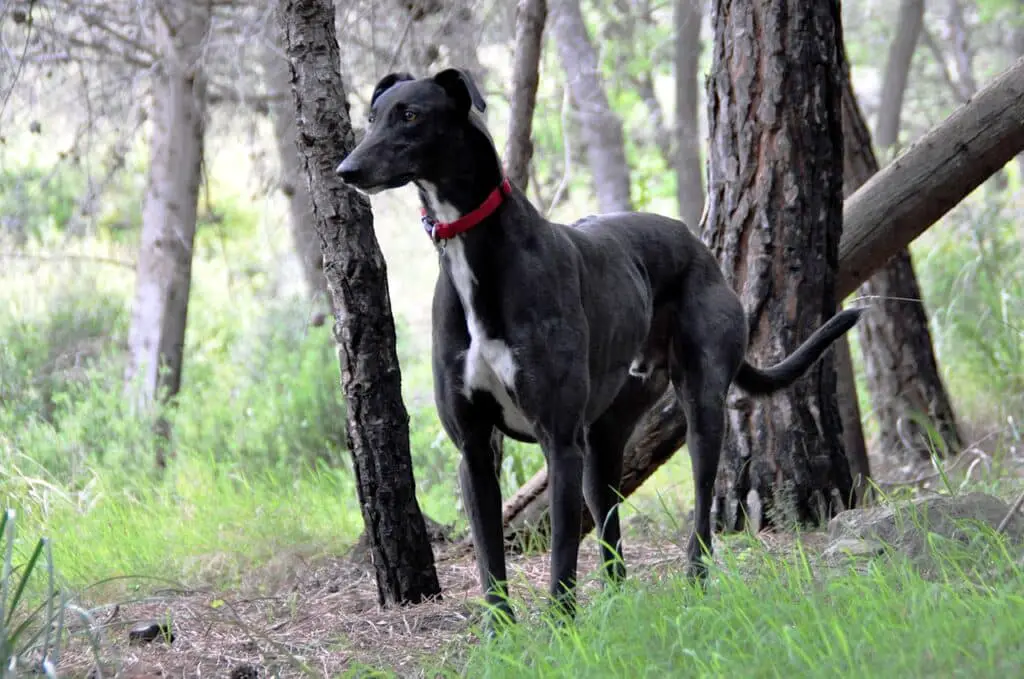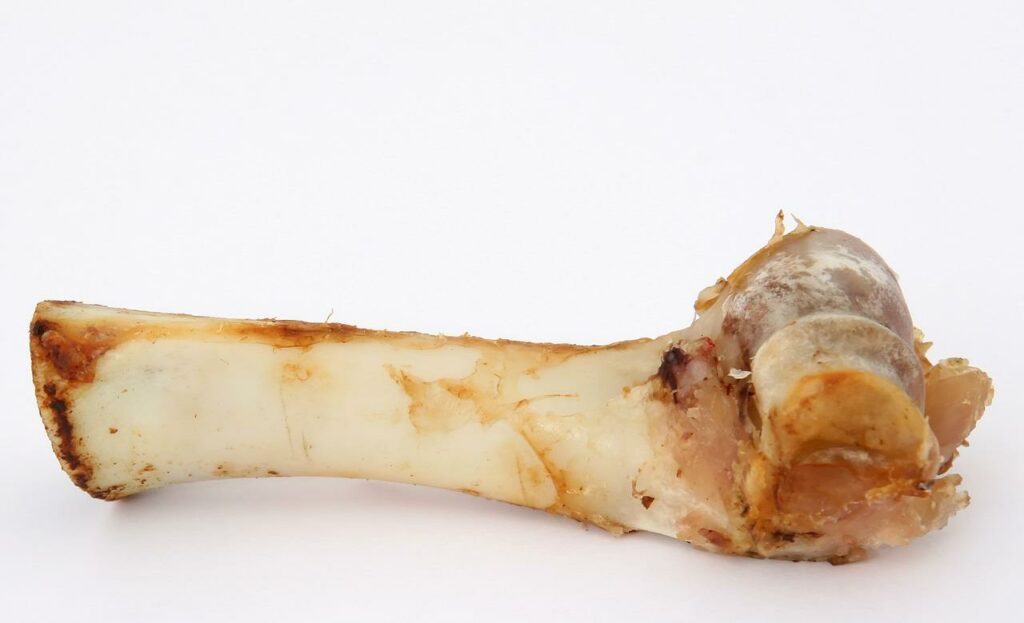You’ve enjoyed a set of BBQ lamb shank chops; just when you want to throw them in the trash, you stop and wonder if you can put them to better use.
It then clicks how dogs are crazy about gnawing on bones, but you’re puzzled; are lamb shank bones safe for dogs?
Are lamb shank bones safe for dogs?
Yes.
Medium-sized lamb shank bones are ideal for dogs; besides the rich calcium, they promote healthy and strong teeth.
Lamb shank bones are hard and abrasive, making them excellent chews compared to dense and raw beef or bison bones.
Contrary, cooked bones are softer and pose a risk of splinters leading to dental and internal organ injuries.
Lamb shank bones are safe for dogs but not without some precautions.
We guide you on how to feed your dog bones and the benefits and risks involved with bones and canines.

What are the health benefits of lamb shank bones for dogs?
Dental health
Dogs need to get hard treats and bones occasionally to strengthen their teeth.
These lamb shank bone chews can minimize the accumulation of dental calculus and tartar in the dog’s teeth, maintaining a hygienic and healthier dental environment.
However, this doesn’t mean a reduced risk of periodontal disease.
Regularly brush your dogs’ teeth or use dental chews specifically for your pups’ dental health.
Source of minerals
Lamb shank bones are a good source of minerals for canines.
It’s difficult for dogs to absorb enough nutrients from a whole bone; therefore, they balance their calcium intake with other mineral sources in the diet.
Otherwise, your dog risks limb deformities and weaknesses due to calcium deficiency if bones are the only source of calcium.

Are lamb shank bones bad for dogs? Potential risks
Lamb shank bone is a nutritious dog treat if consumed moderately.
However, these bones present some risks for your canine friend.
Dental injuries
Feeding hard and thick lamb shank bones to dogs pose a risk of broken or chipped teeth—which can be painful for them.
Similarly, sharp fragments from broken bones due to prolonged gnawing could puncture your dog’s gum or get lodged between teeth.
This will create an unhealthy dental environment.
Internal blockages
Raw lamb shank bones are less fragile and thus not likely to break into tiny pieces that can harm your dogs.
Contrary, cooked lamb bones are brittle, and the fragments can get stuck in your dogs through perforating the internal organs.
Signs of intestinal obstruction include:
- Poor appetite
- Vomiting
- Diarrhea
- Excessive drooling or whimpering
- Lethargy
Bacterial infection
Dogs should be given raw meaty lamb shank bones, which can handle a long chewing session compared to cooked ones.
Any meat in its natural state risks potential bacterial infection for your dog.
Be vigilant and prepare the raw lamb shank bone hygienically to prevent any health problems for your canines.
How to safely give your dog bones: Safety tips
Edibles: These are tiny animal bones like turkey or chicken loaded with extra minerals and vitamins essential for your canine.
They are too small and brittle; therefore, you need to grind them in a blender and add them to your dog’s food.
Chewables: Lamb shank ones fall under this category of medium to big hard and abrasive bones for gnawing purposes.
Besides being entertaining to dogs, they promote stronger teeth and improve general dental health.
Raw bones: Although lamb shank bones are hard, it becomes softer when cooked, increasing the risk of splintering.
Parts like ribs are more fragile when cooked, becoming choking hazards for canines.
Keep raw bones clean and remove any fats or skin.
Bone size matters: Give your dog a lamb shank bone that correlates with their muzzle.
This prevents the possible dangers of swallowing it whole, which may lead to choking.
Remove any sharp edges to avoid injuring your dog’s mouth.
Supervise your dog: Pet owners shouldn’t leave their dogs unattended during a bone chew session.
Monitor for choking, shallow breathing, vomiting, or other gastrointestinal distress.
Can raw lamb shank bone make my dog sick?
Although raw lamb shank bones are safer than cooked ones in terms of splintering, they pose a risk of bacterial infection.
Raw lamb meat carries the risk of transmitting bacteria causing salmonellosis in pets and humans alike.
This will manifest as vomiting, diarrhea, or lethargy if the meat is contaminated.
Thoroughly clean the lamb shank bone and feed it on a clean, hygienic surface to avoid contaminations.
Alternatively, buy bones prepared for a dog’s raw diet BARF (Bones and Raw Food); it minimizes the risk of infections.
Are there safer alternatives to lamb shank bones for dogs?
There are safer chew toys sturdy enough to handle a long chewing session or break into small pieces that are easily swallowed and digested.
Some chew toys have lamb as an ingredient, while others are flavored with lamb meat.
So, if your dog loves the lamb taste, this would be the best chewy snack.
Alternatively, you can make a broth from the leftover lamb shank bones instead of offering them to your furry friend.
Freeze the broth into popsicles and watch how your dog will enjoy the cold bites.
My dog has ingested cooked lamb shank bones; what should I do?
If your dog ingests tiny pieces of lamb shank bones, contact your vet immediately, whether they show signs of distress or not.
Don’t induce vomiting.
Depending on your dog’s size, the small pieces will pass without causing harm to large dogs.
However, there are instances when the bones get stuck in your dog’s gut.
If small bone pieces get lodged in your dog’s throat, they may show digestive distress signs like excessive drooling, coughing, difficulty breathing, vomiting, excessive licking, and rubbing.
Wrapping up
It’s essential to feed your dog a healthy diet and cautiously offer bones as occasional treats.
Medium-sized lamb shank bones can provide them with hours of entertainment, a healthy outlet for playing and chewing, and some additional calcium.
While lamb shank bones are not toxic to dogs, they come with complications.
So, now that you have the above knowledge, feel free to watch your canine gnaw on that piece of lamb bone.
- What Dog Breeds Have Pink Skin? - March 24, 2023
- What Are the Most Inspiring Dog Breeding Quotes? - March 20, 2023
- Can Pheromone Spray Help Improve Dog Breeding Results? - March 19, 2023








